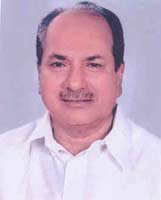Special cell set up to counter growing threat to space assets
10 Jun 2008
India has acquired an Integrated Space Cell under the aegis of the Integrated Defence Services Head Quarters to counter the growing threat to the country's space assets.
 Defence minister AK Antony announced the formation of the new space cell under the aegis of the Integrated Defence Services Head Quarters , while addressing the Unified Commanders' Conference in New Delhi.
Defence minister AK Antony announced the formation of the new space cell under the aegis of the Integrated Defence Services Head Quarters , while addressing the Unified Commanders' Conference in New Delhi.
Antony said that although the country wanted to utilise space for peaceful purposes and remain committed to its policy of non-weaponisation of space, "offensive counter space systems like anti-satellite weaponry, new classes of heavy-lift and small boosters and an improved array of military space systems have emerged in our neighbourhood".
He said the new cell would act as a single window for integration among the armed forces, the department of space and the Indian Space Research Organisation.
The defence minister also announced the approval of the government for the setting up of a Defence Informatics Centre on the lines of the National Informatics Centre to cater to the e-governance needs of the armed forces, the defence ministry and other associated organisations.
He also said a defence information technology consultative committee (DITCC) comprising eminent personalities from the defence ministry, the three services, the ministry of communication and IT, academia and the industry was also being constituted. DITCC would seek to synergise all information technology related matters in the defence ministry, the three services and various organisations.
"DITCC has evolved a road map and a common approach for the integration of information technology in our armed forces," Antony said.
"Our security planning must be able to anticipate and plan in advance," the minister said. The crucial role envisaged for India in the regional and international security environment must focus on the security requirements of the future. "Owing to the complexities of security threats and challenges, defence policy formulation must keep evolving constantly. New dimensions have been added to the security environment around us. Our nation's economic and technological development has to proceed apace with our defence capabilities. At the same time, we need to forge working partnerships to maintain equilibrium of peace and cooperation in the emerging world order."
The defence minister said our most important challenge in the foreseeable future is the growing instability in our neighbourhood. He said India has continuously expressed serious concerns on cross border terrorism and has reiterated the importance of Pakistan fulfilling its commitment outlined in the joint press statement of 6 January 2004 against terrorism.
On Afghanistan, Antony said, it was in our and the region's interest to continue to support the process of rebuilding, to enable it to emerge as a self- sufficient and stable democratic state and expressed concern at the signs of re-emergence of Taliban in Afghanistan.
He said there was enough space India and China to mutually cooperate and develop, while remaining sensitive to each other's concerns. Antony said humanitarian aid worth $ 5 million was provided to China in the aftermath of the devastating earthquake last month.
Antony said a prolonged political vacuum or uncertainty in Bangladesh could have an adverse impact on India. He added that illegal immigration and infiltration are two major security related issues of serious concern.
The defence minister said New Delhi is keeping a close watch on the security situation in Sri Lanka as "Any deterioration in the security situation in Sri Lanka will no doubt have an adverse impact on peace and security within India".
Disclosing that India had sent eight aircraft and two naval ships with loads of relief supplies to Myanmar in the aftermath of the tropical cyclone last month, Antony added that India would continue to play a constructive and positive role through continuous dialogue.
New Delhi remained committed to providing all possible support to Nepal for its transition to a multi-party democracy.
The two-day commmandes conference is focusing on various issues pertaining to ongoing process of jointness amongst the three services, higher defence management and a conceptual way forward. The conference is being attended among others by the chairman, chiefs of staff committee and chief of naval staff, admiral Sureesh Mehta, chief of air staff, air chief marshal F H Major, chief of army staff, general Deepak Kapoor, defence secretary Vijay Singh, chief of integrated service command Lt Gen HS Lidder, commanders and senior officers from the service headquarters and the ministry of defence.


















